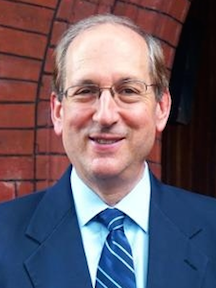This past summer, as we have every three years since the first Triennial Council convening in 1883, representatives from Phi Beta Kappa’s 290+ chapters and nearly 50 alumni associations gathered to chart the course of our future. This was a particularly significant conference as we gathered on the cusp of our 250th anniversary in 2026. Those of us who are honored to work for the Society are keenly aware that it is you, our members, who make possible all that we accomplish. The Triennial Council sounded the major themes of our upcoming semi-quincentennial: the inextricable connection between the liberal arts and sciences and democracy; the evolution of liberal arts education that allows us, firmly grounded in our values, to embrace the future; and our commitment to celebrating inclusive excellence that lifts up outstanding academic achievement wherever it is found.
The Council opened with an esteemed panel exploring the connections between the liberal arts and democracy. It is no mere coincidence that Phi Beta Kappa and our nation were founded within months of each other. A democratic society thrives when its cultural and political institutions are grounded in the principles of liberal arts and sciences education and the commitment to unceasing free inquiry. The scope and meaning of free inquiry on our campuses have been severely tested recently and there is every reason to believe that such challenges will continue this academic year. It is essential that Phi Beta Kappa represents the nonpartisan commitment to the principles we trace to our very origins as a society, where students sought the precious freedom to discuss and debate any topic.
The Triennial also provided the setting for the continuation of a multi-year review of the requirements for membership and for establishment of new chapters, known as the “stipulations.” Discussions of the stipulations can seem technical: e.g., defining the nature of our language requirement or the concept of breadth in a liberal arts program. But the results of this review will be anything but technical. The impact of Phi Beta Kappa on American higher education and indeed on American society is widely accepted, and so our evolving standards matter greatly. Rather than limit student’s passions and interests, we recognize university programs where students in a broad range of academic majors seek out avenues for the kind of critical thinking and analysis that imbues the habits of mind associated with the liberal arts.
This summer we welcomed three new institutions into the Phi Beta Kappa family: the College of Charleston, Gonzaga University, and Texas State University, each of which extends our commitment to inclusive recognition of high-achieving liberal arts graduates. And we elected our new national leadership team: Esther Jones (ΦΒΚ, Fisk University), Associate Dean for Faculty Development at Brown University, as President, and Ronald Crutcher (ΦΒΚ, Miami University), former president of Wheaton College and the University of Richmond, as Vice President. I am grateful for their leadership as we approach our 250th anniversary.
In front of us is the momentous commemoration year of 2026, and we can perhaps stretch to imagine our role in the quarter millennium ahead. Our mission to foster liberal arts and sciences education, to assert its role as a foundation for democracy and as a beacon of clarity in our society, has become ever more pressing. It is inspiring to recognize, nearly 250 years since our founding, we can say that still ahead of us lie not only our best days, but also our most important work.
Frederick M. Lawrence
Secretary and CEO




